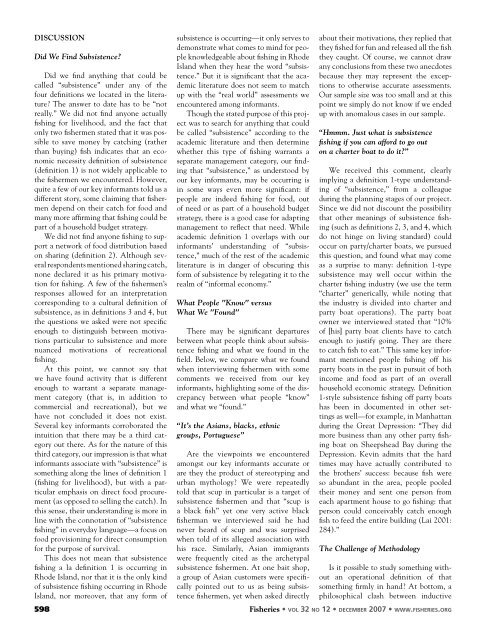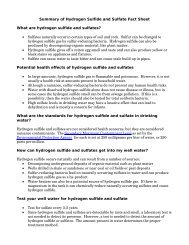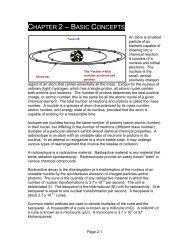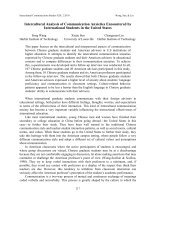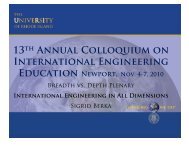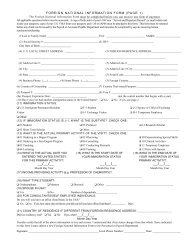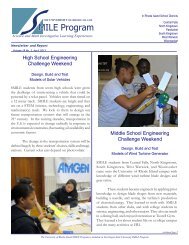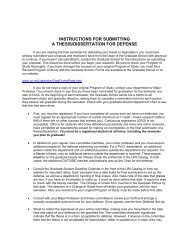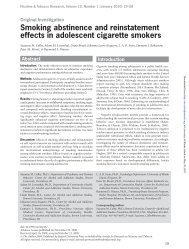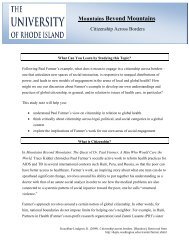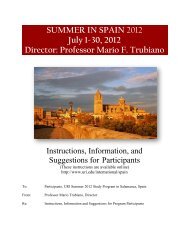Searching for Subsistence: In the Field in Pursuit... - University of ...
Searching for Subsistence: In the Field in Pursuit... - University of ...
Searching for Subsistence: In the Field in Pursuit... - University of ...
Create successful ePaper yourself
Turn your PDF publications into a flip-book with our unique Google optimized e-Paper software.
DISCUSSIONDid We F<strong>in</strong>d <strong>Subsistence</strong>?Did we f<strong>in</strong>d anyth<strong>in</strong>g that could becalled “subsistence” under any <strong>of</strong> <strong>the</strong>four def<strong>in</strong>itions we located <strong>in</strong> <strong>the</strong> literature?The answer to date has to be “notreally.” We did not f<strong>in</strong>d anyone actuallyfish<strong>in</strong>g <strong>for</strong> livelihood, and <strong>the</strong> fact thatonly two fishermen stated that it was possibleto save money by catch<strong>in</strong>g (ra<strong>the</strong>rthan buy<strong>in</strong>g) fish <strong>in</strong>dicates that an economicnecessity def<strong>in</strong>ition <strong>of</strong> subsistence(def<strong>in</strong>ition 1) is not widely applicable to<strong>the</strong> fishermen we encountered. However,quite a few <strong>of</strong> our key <strong>in</strong><strong>for</strong>mants told us adifferent story, some claim<strong>in</strong>g that fishermendepend on <strong>the</strong>ir catch <strong>for</strong> food andmany more affirm<strong>in</strong>g that fish<strong>in</strong>g could bepart <strong>of</strong> a household budget strategy.We did not f<strong>in</strong>d anyone fish<strong>in</strong>g to supporta network <strong>of</strong> food distribution basedon shar<strong>in</strong>g (def<strong>in</strong>ition 2). Although severalrespondents mentioned shar<strong>in</strong>g catch,none declared it as his primary motivation<strong>for</strong> fish<strong>in</strong>g. A few <strong>of</strong> <strong>the</strong> fishermen’sresponses allowed <strong>for</strong> an <strong>in</strong>terpretationcorrespond<strong>in</strong>g to a cultural def<strong>in</strong>ition <strong>of</strong>subsistence, as <strong>in</strong> def<strong>in</strong>itions 3 and 4, but<strong>the</strong> questions we asked were not specificenough to dist<strong>in</strong>guish between motivationsparticular to subsistence and morenuanced motivations <strong>of</strong> recreationalfish<strong>in</strong>g.At this po<strong>in</strong>t, we cannot say thatwe have found activity that is differentenough to warrant a separate managementcategory (that is, <strong>in</strong> addition tocommercial and recreational), but wehave not concluded it does not exist.Several key <strong>in</strong><strong>for</strong>mants corroborated <strong>the</strong><strong>in</strong>tuition that <strong>the</strong>re may be a third categoryout <strong>the</strong>re. As <strong>for</strong> <strong>the</strong> nature <strong>of</strong> thisthird category, our impression is that what<strong>in</strong><strong>for</strong>mants associate with “subsistence” issometh<strong>in</strong>g along <strong>the</strong> l<strong>in</strong>es <strong>of</strong> def<strong>in</strong>ition 1(fish<strong>in</strong>g <strong>for</strong> livelihood), but with a particularemphasis on direct food procurement(as opposed to sell<strong>in</strong>g <strong>the</strong> catch). <strong>In</strong>this sense, <strong>the</strong>ir understand<strong>in</strong>g is more <strong>in</strong>l<strong>in</strong>e with <strong>the</strong> connotation <strong>of</strong> “subsistencefish<strong>in</strong>g” <strong>in</strong> everyday language—a focus onfood provision<strong>in</strong>g <strong>for</strong> direct consumption<strong>for</strong> <strong>the</strong> purpose <strong>of</strong> survival.This does not mean that subsistencefish<strong>in</strong>g a la def<strong>in</strong>ition 1 is occurr<strong>in</strong>g <strong>in</strong>Rhode Island, nor that it is <strong>the</strong> only k<strong>in</strong>d<strong>of</strong> subsistence fish<strong>in</strong>g occurr<strong>in</strong>g <strong>in</strong> RhodeIsland, nor moreover, that any <strong>for</strong>m <strong>of</strong>subsistence is occurr<strong>in</strong>g—it only serves todemonstrate what comes to m<strong>in</strong>d <strong>for</strong> peopleknowledgeable about fish<strong>in</strong>g <strong>in</strong> RhodeIsland when <strong>the</strong>y hear <strong>the</strong> word “subsistence.”But it is significant that <strong>the</strong> academicliterature does not seem to matchup with <strong>the</strong> “real world” assessments weencountered among <strong>in</strong><strong>for</strong>mants.Though <strong>the</strong> stated purpose <strong>of</strong> this projectwas to search <strong>for</strong> anyth<strong>in</strong>g that couldbe called “subsistence” accord<strong>in</strong>g to <strong>the</strong>academic literature and <strong>the</strong>n determ<strong>in</strong>ewhe<strong>the</strong>r this type <strong>of</strong> fish<strong>in</strong>g warrants aseparate management category, our f<strong>in</strong>d<strong>in</strong>gthat “subsistence,” as understood byour key <strong>in</strong><strong>for</strong>mants, may be occurr<strong>in</strong>g is<strong>in</strong> some ways even more significant: ifpeople are <strong>in</strong>deed fish<strong>in</strong>g <strong>for</strong> food, out<strong>of</strong> need or as part <strong>of</strong> a household budgetstrategy, <strong>the</strong>re is a good case <strong>for</strong> adapt<strong>in</strong>gmanagement to reflect that need. Whileacademic def<strong>in</strong>ition 1 overlaps with our<strong>in</strong><strong>for</strong>mants’ understand<strong>in</strong>g <strong>of</strong> “subsistence,”much <strong>of</strong> <strong>the</strong> rest <strong>of</strong> <strong>the</strong> academicliterature is <strong>in</strong> danger <strong>of</strong> obscur<strong>in</strong>g this<strong>for</strong>m <strong>of</strong> subsistence by relegat<strong>in</strong>g it to <strong>the</strong>realm <strong>of</strong> “<strong>in</strong><strong>for</strong>mal economy.”What People "Know" versusWhat We "Found"There may be significant departuresbetween what people th<strong>in</strong>k about subsistencefish<strong>in</strong>g and what we found <strong>in</strong> <strong>the</strong>field. Below, we compare what we foundwhen <strong>in</strong>terview<strong>in</strong>g fishermen with somecomments we received from our key<strong>in</strong><strong>for</strong>mants, highlight<strong>in</strong>g some <strong>of</strong> <strong>the</strong> discrepancybetween what people “know”and what we “found.”“It’s <strong>the</strong> Asians, blacks, ethnicgroups, Portuguese”Are <strong>the</strong> viewpo<strong>in</strong>ts we encounteredamongst our key <strong>in</strong><strong>for</strong>mants accurate orare <strong>the</strong>y <strong>the</strong> product <strong>of</strong> stereotyp<strong>in</strong>g andurban mythology? We were repeatedlytold that scup <strong>in</strong> particular is a target <strong>of</strong>subsistence fishermen and that “scup isa black fish” yet one very active blackfisherman we <strong>in</strong>terviewed said he hadnever heard <strong>of</strong> scup and was surprisedwhen told <strong>of</strong> its alleged association withhis race. Similarly, Asian immigrantswere frequently cited as <strong>the</strong> archetypalsubsistence fishermen. At one bait shop,a group <strong>of</strong> Asian customers were specificallypo<strong>in</strong>ted out to us as be<strong>in</strong>g subsistencefishermen, yet when asked directlyabout <strong>the</strong>ir motivations, <strong>the</strong>y replied that<strong>the</strong>y fished <strong>for</strong> fun and released all <strong>the</strong> fish<strong>the</strong>y caught. Of course, we cannot drawany conclusions from <strong>the</strong>se two anecdotesbecause <strong>the</strong>y may represent <strong>the</strong> exceptionsto o<strong>the</strong>rwise accurate assessments.Our sample size was too small and at thispo<strong>in</strong>t we simply do not know if we endedup with anomalous cases <strong>in</strong> our sample.“Hmmm. Just what is subsistencefish<strong>in</strong>g if you can af<strong>for</strong>d to go outon a charter boat to do it?”We received this comment, clearlyimply<strong>in</strong>g a def<strong>in</strong>ition 1-type understand<strong>in</strong>g<strong>of</strong> “subsistence,” from a colleaguedur<strong>in</strong>g <strong>the</strong> plann<strong>in</strong>g stages <strong>of</strong> our project.S<strong>in</strong>ce we did not discount <strong>the</strong> possibilitythat o<strong>the</strong>r mean<strong>in</strong>gs <strong>of</strong> subsistence fish<strong>in</strong>g(such as def<strong>in</strong>itions 2, 3, and 4, whichdo not h<strong>in</strong>ge on liv<strong>in</strong>g standard) couldoccur on party/charter boats, we pursuedthis question, and found what may comeas a surprise to many: def<strong>in</strong>ition 1-typesubsistence may well occur with<strong>in</strong> <strong>the</strong>charter fish<strong>in</strong>g <strong>in</strong>dustry (we use <strong>the</strong> term“charter” generically, while not<strong>in</strong>g that<strong>the</strong> <strong>in</strong>dustry is divided <strong>in</strong>to charter andparty boat operations). The party boatowner we <strong>in</strong>terviewed stated that “10%<strong>of</strong> [his] party boat clients have to catchenough to justify go<strong>in</strong>g. They are <strong>the</strong>reto catch fish to eat.” This same key <strong>in</strong><strong>for</strong>mantmentioned people fish<strong>in</strong>g <strong>of</strong>f hisparty boats <strong>in</strong> <strong>the</strong> past <strong>in</strong> pursuit <strong>of</strong> both<strong>in</strong>come and food as part <strong>of</strong> an overallhousehold economic strategy. Def<strong>in</strong>ition1-style subsistence fish<strong>in</strong>g <strong>of</strong>f party boatshas been <strong>in</strong> documented <strong>in</strong> o<strong>the</strong>r sett<strong>in</strong>gsas well—<strong>for</strong> example, <strong>in</strong> Manhattandur<strong>in</strong>g <strong>the</strong> Great Depression: “They didmore bus<strong>in</strong>ess than any o<strong>the</strong>r party fish<strong>in</strong>gboat on Sheepshead Bay dur<strong>in</strong>g <strong>the</strong>Depression. Kev<strong>in</strong> admits that <strong>the</strong> hardtimes may have actually contributed to<strong>the</strong> bro<strong>the</strong>rs’ success: because fish wereso abundant <strong>in</strong> <strong>the</strong> area, people pooled<strong>the</strong>ir money and sent one person fromeach apartment house to go fish<strong>in</strong>g: thatperson could conceivably catch enoughfish to feed <strong>the</strong> entire build<strong>in</strong>g (Lai 2001:284).”The Challenge <strong>of</strong> MethodologyIs it possible to study someth<strong>in</strong>g withoutan operational def<strong>in</strong>ition <strong>of</strong> thatsometh<strong>in</strong>g firmly <strong>in</strong> hand? At bottom, aphilosophical clash between <strong>in</strong>ductive598 Fisheries • VOL 32 NO 12 • DECEMBER 2007 • WWW.FISHERIES.ORG


